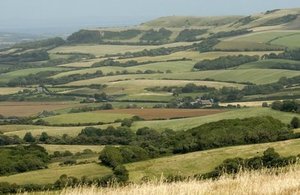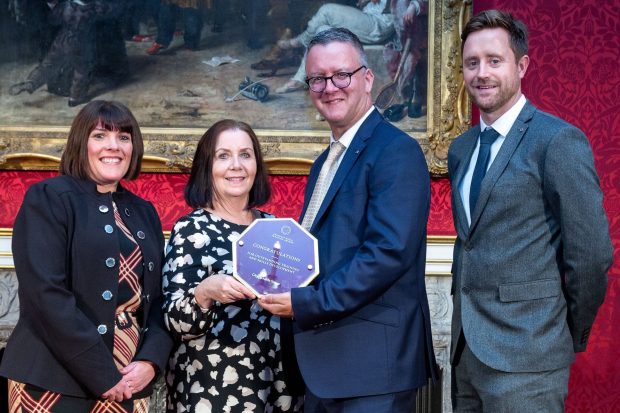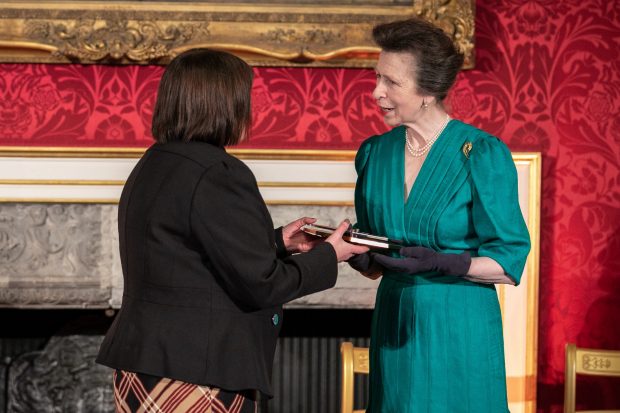- new government-backed virtual satellite data centre will analyse the impact climate change is having on the UK, help shape policies on reducing carbon emissions, and contribute to reaching net zero targets
- 50 new PhD researchers and £5 million investment to enable use of satellite images to better predict future weather trends and protect communities from flooding and pollution
- Earth Observation experts from the Universities of Edinburgh and Leeds will work with 18 businesses on pioneering work to monitor the impact of climate change
Ministers today (30 December) announced backing for ground-breaking research analysing satellite images that will better predict the future impact of climate change in towns and cities and inform future government action.
A new £5 million satellite data centre involving the Universities of Edinburgh and Leeds will use cutting-edge satellite technology to help combat climate change, including helping lower the risk of people being affected by flooding. The data centre will bring together 50 of the UK’s brightest and best PhD researchers to help solve climate change.
Measurements from satellites on rising sea levels, greenhouse gases and shrinking glaciers and forests will help provide policy makers, government and industry with the data and knowledge they need to better understand the impact of climate change and make future predictions.
This knowledge and data could lead to the adaptation of preventative measures for vulnerable areas such as installing flood defences to protect coastal towns, identifying areas increasingly at risk of flooding and monitoring pollution levels in towns and cities.
Business Secretary Andrea Leadsom said:
The UK is leading the world in tackling climate change and we have set the bar high, as the first country to legislate to eliminate our contribution to climate change by 2050, and the fastest in the G20 to cut emissions.
This new satellite data centre will give us instant images showing us the true impact of climate change and in doing so, help us develop innovative new ways of tackling it.
Dr Anna Hogg, co-director of the centre in the School of Earth and Environment at the University of Leeds, said:
Earth observation satellites collect hundreds of terabytes of data per day, delivering important information about how fast glaciers flow, the size of forest fires in the Amazon, and the quality of the air that we breathe.
We have a fantastic opportunity to grow the community of researchers with the skills and knowledge to measure the how our environment is changing.
Dr Edward Mitchard, centre leader at the University of Edinburgh, said:
We are looking for outstanding candidates from environmental science, maths, physics, engineering and computer science disciplines to undertake a PhD in this exciting and innovative centre.
The students will belong to a happy, inclusive and stimulating research environment, with supervision from world-leading earth observation scientists.
The 50 new PhD researchers will work closely with experts from UK universities at Leeds and Edinburgh as well as leading Earth Observation scientists and industry-leaders.
The Centre for Satellite Data in Environmental Science (SENSE), is a virtual academic collaboration and is being established with funding from the Natural Environment Research Council (NERC) and the UK Space Agency (UKSA). It will work with 18 businesses and partners, including Airbus and Unilever, who will co-fund, co-design and co-supervise 42 of the PhD research projects.
Professor Duncan Wingham, Executive Chair of NERC, said:
The researchers will support cutting-edge scientific discovery, new data-based products and new Earth observation technologies that will provide benefits to society.
Working with the UK Space Agency gives students unique opportunities to engage with the wider community.
Beth Greenaway, Head of Earth Observation and Climate at the UK Space Agency, said:
We are at the forefront of innovative new technology for measuring our planet from space.
We have many of the world’s leading scientists and academics who can use this data for new discoveries, and we have a commercial sector able to build the space missions and create services for the public and private sector.
The rapid growth of the Earth Observation sector means we need to attract thousands of people with the right skills over the next 10 years.
The new centre will be funded by £2.3 million funding over 3 years from NERC’s core grant with money from UK Space Agency for specific student activity support. This is matched by £3.4 million additional funding from business/industry as well as the universities own funds.
The independent ‘UK space industry: size and health report’, published in January 2019, showed that, compared to the 2016 survey Earth Observation services, such as data for monitoring land use and agriculture, is a significant growth area, supporting £92 billion of GDP and growing at a rate of 25% per year.
At the 2019 European Space Agency Ministerial Council in November the UK Space Agency committed over £200 million of investment in Earth Observation, including a UK-led TRUTHS mission to help tackle climate change and the ESA Copernicus Space Component, which runs to 2028.
(Image credit: Contains modified Copernicus Sentinel data (2016 to 2018), processed by ESA, CC BY-SA 3.0 IGO).


